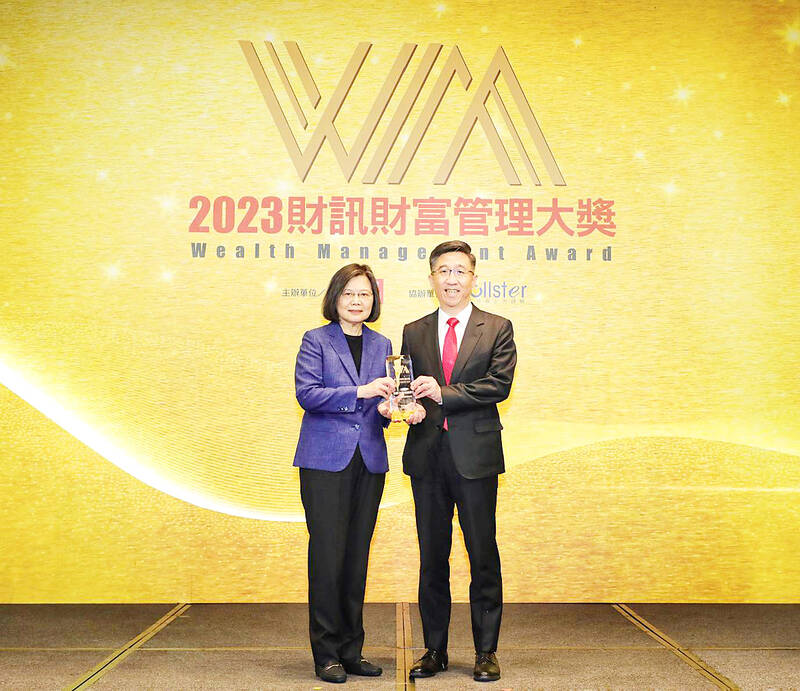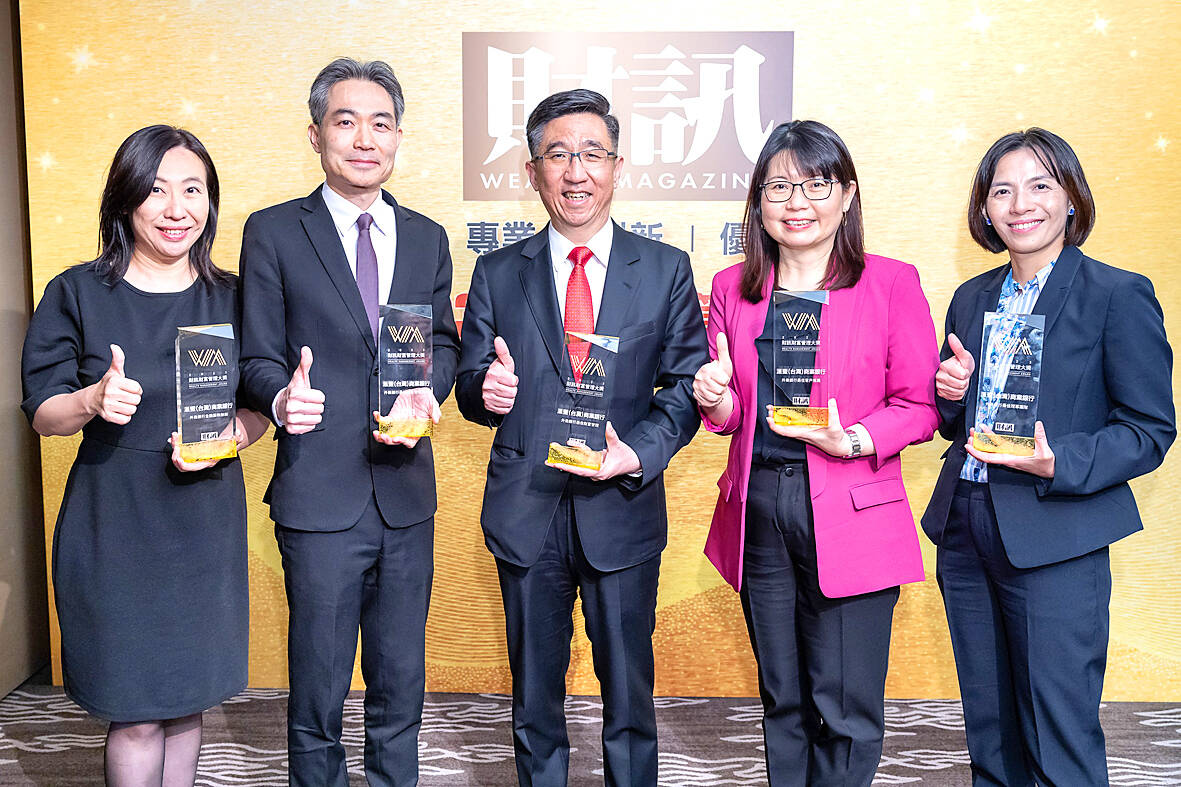HSBC Bank Taiwan Ltd (滙豐台灣商銀) has won five major accolades at Wealth Magazine’s 2023 Wealth Management Awards. In the category of foreign banks, HSBC Taiwan scooped the Best Wealth Management Award, Best Relationship Manager Team Award, Best Customer Recommendation Award, Best Digital Intelligence System Award and Financial Service Innovation Award.
This is the fourth consecutive year that HSBC Taiwan has won the Best Wealth Management Award and Best Relationship Manager Team Award, demonstrating HSBC Taiwan’s outstanding achievements in serving the wealth management market, cultivating talent and continuously upgrading its digital platform.
HSBC Taiwan president Adam Chen (陳志堅) attended the awards ceremony yesterday, receiving the trophy for the Best Wealth Management Award from President Tsai Ing-wen (蔡英文).

Photo courtesy of HSBC Bank Taiwan Ltd
“HSBC has committed to investing US$3.5 billion over several years to develop wealth management in the Asia-Pacific region, including one of its key markets, Taiwan,” Chen said.
“Despite the challenges affecting global markets last year, HSBC continued to invest in talent, platforms, products and digital service capabilities in Taiwan, and we leverage HSBC’s international network to provide our clients with the most professional and sophisticated wealth management services,” he said.
As the only foreign bank in Taiwan with a global presence, HSBC has observed rapid growth in Taiwan’s wealth management market in recent years.

Photo courtesy of HSBC Bank Taiwan Ltd
By 2030, the proportion of Taiwanese adults with wealth of at least US$1 million would reach 10.2 percent, the fourth-highest in Asia, after only Singapore, Australia and Hong Kong, HSBC’s Asia wealth report said.
To provide high-net-worth clients with exclusive and prestigious banking experiences, HSBC has injected resources to establish best-in-class wealth centers in Taipei and Taoyuan, with third center to open in Taichung this year.
“HSBC aims to become the best international wealth manager in Taiwan. We provide our clients with investment analysis from a global team of experts, as well as market-leading and tailor-made wealth management plans. We continuously invest to optimize our digital platform, introduce diversified investment products and leverage international connectivity to offer international financial and wealth services to our clients,” HSBC Taiwan head of wealth and personal banking Linda Yip (葉清玉) said.
In addition to providing professional wealth management services to clients, HSBC Taiwan has also been developing digital finance, and its holistic investment platform on its mobile banking app won it the Financial Service Innovation Award from Wealth Magazine this year.
As consumers’ digital investment behaviors shift from computers to mobile phones, HSBC Taiwan has upgraded its mobile banking app to develop a 100 percent digitalized investment process.
Through mobile phones, clients can carry out diversified investment transactions at any time or place, including foreign currency exchanges, onshore and offshore fund investments, and instant investment transactions on US and Hong Kong shares, which break time and geographical restrictions.
HSBC is the only bank in Taiwan that offers digital services — Internet banking and mobile banking — to private banking clients.
Clients can adjust their portfolios flexibly 24 hours a day and grasp market opportunities.

PERSISTENT RUMORS: Nvidia’s CEO said the firm is not in talks to sell AI chips to China, but he would welcome a change in US policy barring the activity Nvidia Corp CEO Jensen Huang (黃仁勳) said his company is not in discussions to sell its Blackwell artificial intelligence (AI) chips to Chinese firms, waving off speculation it is trying to engineer a return to the world’s largest semiconductor market. Huang, who arrived in Taiwan yesterday ahead of meetings with longtime partner Taiwan Semiconductor Manufacturing Co (TSMC, 台積電), took the opportunity to clarify recent comments about the US-China AI race. The Nvidia head caused a stir in an interview this week with the Financial Times, in which he was quoted as saying “China will win” the AI race. Huang yesterday said

Japanese technology giant Softbank Group Corp said Tuesday it has sold its stake in Nvidia Corp, raising US$5.8 billion to pour into other investments. It also reported its profit nearly tripled in the first half of this fiscal year from a year earlier. Tokyo-based Softbank said it sold the stake in Silicon Vally-based Nvidia last month, a move that reflects its shift in focus to OpenAI, owner of the artificial intelligence (AI) chatbot ChatGPT. Softbank reported its profit in the April-to-September period soared to about 2.5 trillion yen (about US$13 billion). Its sales for the six month period rose 7.7 percent year-on-year

MORE WEIGHT: The national weighting was raised in one index while holding steady in two others, while several companies rose or fell in prominence MSCI Inc, a global index provider, has raised Taiwan’s weighting in one of its major indices and left the country’s weighting unchanged in two other indices after a regular index review. In a statement released on Thursday, MSCI said it has upgraded Taiwan’s weighting in the MSCI All-Country World Index by 0.02 percentage points to 2.25 percent, while maintaining the weighting in the MSCI Emerging Markets Index, the most closely watched by foreign institutional investors, at 20.46 percent. Additionally, the index provider has left Taiwan’s weighting in the MSCI All-Country Asia ex-Japan Index unchanged at 23.15 percent. The latest index adjustments are to

CRESTING WAVE: Companies are still buying in, but the shivers in the market could be the first signs that the AI wave has peaked and the collapse is upon the world Taiwan Semiconductor Manufacturing Co (TSMC, 台積電) yesterday reported a new monthly record of NT$367.47 billion (US$11.85 billion) in consolidated sales for last month thanks to global demand for artificial intelligence (AI) applications. Last month’s figure represented 16.9 percent annual growth, the slowest pace since February last year. On a monthly basis, sales rose 11 percent. Cumulative sales in the first 10 months of the year grew 33.8 percent year-on-year to NT$3.13 trillion, a record for the same period in the company’s history. However, the slowing growth in monthly sales last month highlights uncertainty over the sustainability of the AI boom even as